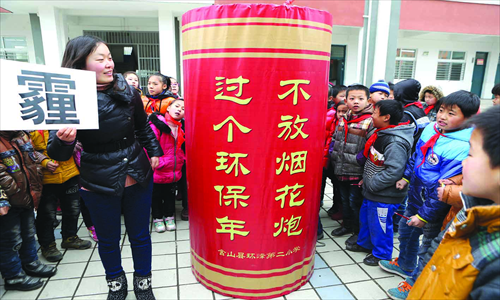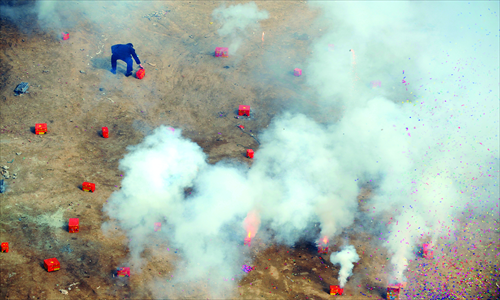No smoke without fireworks

Primary school students in Hanshan county, Anhui Province, get ready to sign on a giant firecracker on January 13, pledging not to set off any fireworks in order to have a more environmentally friendly Spring Festival. Photo: CFP
For Spring Festival this year, Mo Minli made a decision that went against hundreds of years of Chinese tradition.
The native of Ningbo, East China's Zhejiang Province, organized a campaign to boycott fireworks this year in order to prevent pollution.
The idea came about after Mo experienced living in smog for the first time in her life last December.
The coastal city of Ningbo had always enjoyed clear blue-sky days even when the rest of the country was buried in smog, but on December 4, 2013, the pollution hit and lingered for nearly a week. It caused huge inconvenience and made Mo realize something had to be done about it.
Mo wasn't the only one with this plan. A search would find that many in China made a similar commitment this year both on Weibo and through media, mostly because of the smoggy weather in China in 2013.
At the same time, alternative ways of enjoying fireworks, such as e-fireworks and "green" fireworks, started emerging on the market.

A man sets off fireworks before a wedding in Taiyuan, Shanxi Province, on November 24, 2013. Photo: CFP
Boycott proposal
After living in smog for a week, Mo realized the problem was more serious than she had originally thought. She downloaded a cellphone app that would update and alert her with real-time Air Quality Index readings and ordered packets of masks online to protect herself.
"It brought so much inconvenience to our lives," she said. "We could barely see anything, the traffic was congested all the time and the situation grew so severe later on that schools were closed."
In order to get away from the smog, Mo and a couple of friends drove to the countryside. She thought she would be able to get at least some fresh air, but the conditions there weren't much better.
It was the last straw for Mo. She and her friends decided to do something about it.
Mo is part of the grass-roots organization Ningbo Micro Alliance and the spokesperson on its Weibo microblog account. Last October, when Typhoon Fitow struck the southern regions of China, the alliance rushed to the front line to provide relief and help.
After signing a proposal to boycott fireworks this year, the alliance sent out a Weibo post reiterating the pledge, which was soon forwarded by media and the general public in Ningbo.
In other parts of China, groups as well as media have also united to voice their concern.
In the Yangtze River Delta area, media, environmental groups and citizens organized an anti-smog campaign.
Chu Xumin, the leader of the weather group under Green Zhejiang, an environmental group based in Hangzhou, told the Global Times that the campaign was started around the same time the smog engulfed Zhejiang Province.
The proposal advocates cutting down on the amount of fireworks set off during the holidays, he said.
"We propose that people use e-fireworks instead of real ones. Some people think they definitely need fireworks during the new year and this is our response, that we can choose this way to enjoy fireworks and not the traditional way that pollutes the air," he said.
The smog in Hangzhou has been getting more serious in recent years. In 2013, about two-thirds of the days were polluted with smog, Chu said.
Some local governments also joined in the campaign. In Changchun, Jilin Province, the office in charge of preventing the setting off of illegal fireworks and the city's Communist Youth League joined together at the end of December to encourage the public to observe a green and low-carbon new year, the local City Evening News reported.
The regulation states that setting off fireworks in Changchun is restricted to about three weeks around the Spring Festival dates. Any citizen can report to the government if they discover illegal activities.
On December 21, 2013, some people reported that a restaurant set off fireworks to celebrate its new opening, and the Changchun police bureau fined it 500 yuan, the East Asia Economy and Trade News reported.
The Hangzhou government has also canceled the annual fireworks show for this year due to concerns over large-scale pollution, Chu said. The show has been a tradition for more than 10 years.
Beijing also tightened its regulations this year. According to the office that supervises the use of fireworks and firecrackers, this year, anyone who buys five boxes or more of fireworks at one time will need to register with their ID. In addition, if the government issues orange or red alerts for smog, the sale of fireworks and firecrackers will be halted, the Beijing Times reported.
Old habits die hard
Not everybody is behind the idea of giving up the tradition completely.
Yin Zhiyuan, who was born and raised in Beijing, said setting off fireworks brings a "new year flavor."
When growing up, he always set off fireworks with his brothers and sisters after family dinners, he said. Being a boy, he loved that tradition and didn't mind the noise.
Yin can still clearly describe his favorite fireworks, ertijiao and chuantianhou, the former only making two bangs, once on the ground and once again after it flies into the sky. The latter flies straight into the sky after being lit and explodes into shimmering fragments.
Yin thinks totally boycotting fireworks isn't a good idea, but he understands people's fear of the smog and supports cutting back on them. He also questions the legitimacy of the boycott just for the smog.
"We've been setting off fireworks since we were young, and we've never had smog," he said.
Yin isn't alone in thinking this. After sending out the statement on Weibo, Mo also received criticism, with some saying that not setting off fireworks for a few days won't make a great deal of difference.
Ma Jun, director of the Institute of Public and Environmental Affairs, a non-government organization based in Beijing, told the Global Times that it has been proven that setting off fireworks can increase air pollution, especially during Spring Festival.
On January 22, 2012, the day before Chinese New Year, the concentration of PM 2.5 detected at Chegongzhuang station on the west Second Ring Road rose from 40 micrograms per cubic meter at 6 pm, to as high as 1,593 micrograms per cubic meter around midnight, a reading that indicates severe pollution.
In a proposal to the government last year, Ma suggested that an index be set up and published so the public could know when weather conditions weren't good for setting off fireworks.
Pursuing alternatives
He Yongzhen, a 38-year-old software developer in Beijing, considers himself one of the younger generation who holds fond memories of fireworks.
He clearly remembers the excitement before Chinese New Year, when he would always empty his drawer just for fireworks that he would start collecting weeks ahead of the holiday.
"I would put a layer of the paper in the drawer first, then carefully lay the firecrackers on top, because I was afraid of them getting wet," he said. "On the day, I set them off one at a time instead of all at once, so I could enjoy them a little longer."
He agrees with Yin that the fun of Chinese New Year is somewhat dimmed without this old tradition. Therefore, while volunteering for environmental group Friends of Nature last year, he helped develop a cellphone app that generates e-fireworks.
The app has three modes and is interactive. If you shake your phone or blow directly at it, the fireworks assimilated in the app will grow bigger and louder.
After it was developed in February 2012, the app was downloaded 2,491 times in over 10 countries and regions, including the Chinese mainland, Taiwan, Hong Kong and the US, according to official data on iTunes.
All the talk of boycotting fireworks isn't harming the major players in the industry. Wei Bo, head of marketing from Panda Fireworks, told the Global Times that last year the company stocked 23,000 boxes of fireworks, while this year it stocked 20,000, a slight drop from the previous year. In addition to these sales, the company also found a new niche.
"We have had the environmental firework product for a couple years, but this is the first year we are testing out the market," Wei said, explaining that the "big foot" firework on top of the Bird's Nest stadium during the opening night of the 2008 Beijing Olympics was one of their "environmental fireworks."
The central idea is to use materials that generate less sulphide when they explode in the air, as well as papers that are recyclable, Wei said. The reason the company hasn't used much of that in the past is the higher costs. But firework companies are always attentive to the public's interests and market needs, he added.
Ma thinks "environmental fireworks" are a good attempt by the firework industry. However, he thinks the effects will only be clear after a couple of years of market testing.
Banning fireworks only scratches the surface of the problem, Ma said, and tackling the air pollution problem certainly cannot rely only on these measures. However, he said on windless days if there's a concentrated setting off of fireworks, it can still cause heavy pollution.
"The government can guide the public with legal measures, for example limiting the sale of large-scale fireworks. The public can also restrict themselves on a moral basis and voluntarily cut down on fireworks," he said.